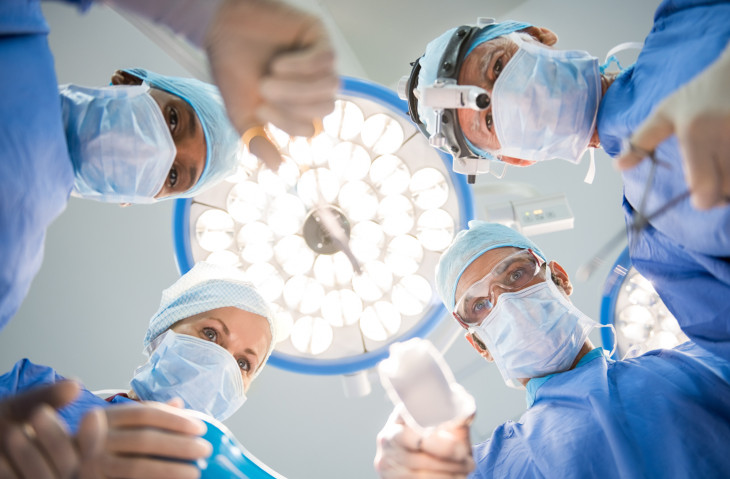Surgeons and physicians may focus in a medical specialty such as: dermatology, radiology, cardiology or pathology. These career choices require an extensive commitment due to demanding training and education requirements. The majority of physicians finish a minimum of 4 years of undergraduate studies, followed by 4 years of medical school. There can be 3 to 8 years in residency and internship programs, depending on the specialty.
Education & Training
The majority of medical school applicants have a minimum of a bachelor's degree. Others hold advanced degrees. Even though no particular major is required, every student must complete undergraduate work in mathematics, biology, English, physics and chemistry. Students also take social sciences and humanities courses. Some students volunteer at clinics or local hospitals in order to gain experience in a healthcare atmosphere.
As medical schools are extremely competitive, applicants need to submit scores from the MCAT or Medical College Admission Test, recommendation letters and transcripts. Additionally, schools consider an applicant's leadership qualities, personality and participation in extracurricular activities. The majority of schools require applicants to interview with the admissions committee members.
There are some med schools that offer combined medical school programs and undergraduate programs that run 6 to 7 years in length.
The first two years of medical school are typically spent in classrooms and laboratories. Popular courses include: biochemistry, anatomy, medical ethics, pharmacology, the laws governing medicine and psychology. Practical skills such as: examining patients, taking medical histories and practicing differential diagnosis.
The final two years of medical school has student doctors working with patients while being supervised by senior physicians within clinic and hospital settings. During this practicum, students rotate through psychiatry, family practice, internal medicine, pediatrics, surgery, obstetrics and gynecology. This rotation exposes student doctors to a realm of specialties where they can acquire experience in diagnosing and treating illnesses in numerous areas.
Once medical school ends, most graduates commence a residency program in a specialty of their interest. Typically, residency takes place in a hospital and depending on the specialty, may last from 3 to 8 years.
Licenses, Certifications, and Registrations
All surgeons and physicians must be licensed. Requirements vary from place to place. Candidates must graduate from an accredited medical school, pass practical and written exams and complete residency training in the specialty they choose.
A standardized national licensure examination must be passed by all surgeons and physicians. The USMLE or the U.S. Medical Licensing Examination and the Comprehensive Osteopathic Medical Licensing Examination (COMLEX-USA) are popular.
Surgeons and physicians do not necessarily have to become certified; however, their employment opportunities may increase dramatically. D.O.s and M.D.s seeking board certification in a specialty may spend an additional 7 years in residency. The ABMS or American Board of Medical Specialties or the AOA American Osteopathic Association provides certification after exams are completed upon finishing residency.
Skills and Qualities that will Help
Communication Skills: It is vital that surgeons and physicians communicate excellently and efficiently with both healthcare support staff and their patients.
Compassion: These careers see numerous patients who are injured or sick on a daily basis. Individuals may be in extreme distress or pain. Surgeons and physicians need to be able to treat their patients and their families with patience, understanding and compassion.
Detail Oriented: Seeing so many patients, it is vital that surgeons and physicians are treated with the proper medications and treatment protocol. Numerous pieces of information must be monitored and recorded in terms of patient care.
Dexterity: Surgeons and physicians need to be good at working with their hands. It common to have to use sharp tools very precisely and mistakes could be extremely grave.
Leadership Skills: It is important that physicians are capable of being effective leaders as they work in their own practice. It is often necessary for them to manage a staff of other professionals as part of their practice.
Organizational Skills: In order to run their own business in a medical setting, physicians need to have strong organizational skills and excellent record keeping ability.
Patience: Surgeons and physicians may work with a variety of patients who require special attention. For example children or adult patients who are afraid of medical treatment and uncooperative will require more patience.
Physical Stamina: Surgeons and physicians ideally should be comfortable turning or lifting disabled patients. Surgeons commonly spend a large amount of time bending over patients during operations.
Problem-Solving Skills: Surgeons and physicians need to evaluate the symptoms and administer the proper means of treatment. Oftentimes these duties are performed in an emergency setting to save a patient's life.









